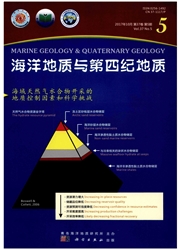

 中文摘要:
中文摘要:
作为长期碳汇,海洋沉积物中埋藏的大量有机碳对全球碳循环和气候变化有重要影响。有机碳从海洋输出到沉积物中后,在沉积物中还要经历有氧降解和无氧降解。有机物降解是一个十分复杂的过程,影响这一过程的因素有很多,包括有机物本身的分子结构和组成种类;氧化还原状态;有机物所附着的基质;温度、压力、盐度等物理环境因素以及生物因素。研究沉积有机碳的含量及埋藏量变化首先需要校正降解对沉积有机碳含量的影响。降解模式是定量估算降解对沉积有机碳的影响的一个主要手段。在前人的研究基础上,讨论了影响沉积有机碳降解的因素,对降解模式的研究进展和应用进行了综述,提出了未来降解模式的发展中存在的问题。
 英文摘要:
英文摘要:
As a long-term carbon sink,marine sediments preserve abundant organic carbon,and have important implications for climate change and carbon cycle.The organic carbon in the marine sediments would experience both aerobic and anaerobic degradation in the sediments.The process of the degradation is complicated,influenced by the chemical structure of the organic compound,the redox condition,the absorption of the sediments,temperature,pressure and biological activities.Therefore,it is essential to evaluate the effect of degradation in assessing the change in sedimentary organic carbons.The effect of degradation on sedimentary organic carbons can be estimated by degradation models.In this paper,the factors affecting the degradation process and the development of the models are reviewed,and the problems in model study are discussed.
 同期刊论文项目
同期刊论文项目
 同项目期刊论文
同项目期刊论文
 Biomarker records of phytoplankton productivity and community structure changes in the Central Yello
Biomarker records of phytoplankton productivity and community structure changes in the Central Yello Biomarker Records of Phytoplankton Productivity and Community Structure Changes of the Last 14000 ye
Biomarker Records of Phytoplankton Productivity and Community Structure Changes of the Last 14000 ye Sedimentary Records of Short Chain Chlorinated Paraffins in the Zhejiang-Fujian Mud Area of the East
Sedimentary Records of Short Chain Chlorinated Paraffins in the Zhejiang-Fujian Mud Area of the East Biomarker evidence for paleoenvironmental changes in the southern Yellow Sea over the last 8200 year
Biomarker evidence for paleoenvironmental changes in the southern Yellow Sea over the last 8200 year Source and Migration of Short-Chain Chlorinated Paraffins in the Coastal East China Sea Using Multip
Source and Migration of Short-Chain Chlorinated Paraffins in the Coastal East China Sea Using Multip 期刊信息
期刊信息
